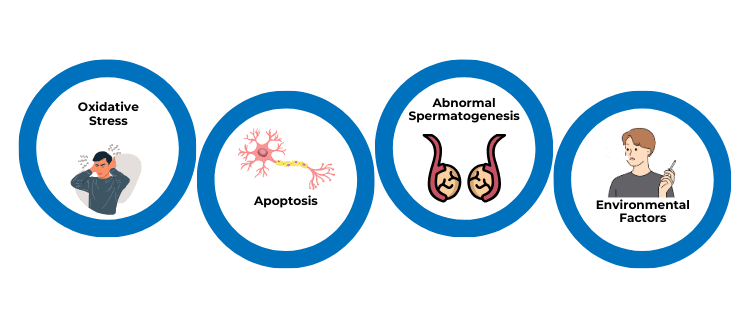Infertility affects around 15% of couples, and while the focus often falls on women, men’s reproductive health is equally crucial. One significant issue impacting male fertility is Sperm DNA Fragmentation. This condition can complicate conception, whether naturally or through assisted reproductive technologies like IVF (In Vitro Fertilization) and ICSI (Intracytoplasmic Sperm Injection).
What Is Sperm DNA Fragmentation?
Sperm DNA Fragmentation refers to damage or breaks in the DNA within a sperm cell. DNA is essential for transmitting genetic information needed to create a healthy baby. If sperm DNA is fragmented, it can impair fertilization, affect embryo development, or lead to miscarriage. The DNA in sperm is tightly packed in the sperm’s head, and any damage to this DNA can result in genetic issues, making it difficult for a healthy pregnancy to occur.
Causes of Sperm DNA Fragmentation

Sperm DNA fragmentation can arise from several factors:
• Oxidative Stress: This occurs when harmful molecules called reactive oxygen species (ROS) exceed antioxidants, leading to DNA damage.
• Apoptosis: This describes the process of programmed cell death. When sperm cells are not properly cleared away, they can become damaged.
• Abnormal Spermatogenesis: The process of sperm production can sometimes be flawed, resulting in DNA breaks.
• Environmental Factors: Exposure to radiation, pollution, or toxins can also damage sperm DNA.
Common Causes
Several lifestyle and health factors contribute to sperm DNA fragmentation:
1. Age: As men get older, their sperm DNA is more likely to be damaged.
2. Smoking: Cigarette smoking increases oxidative stress, which harms sperm DNA.
3. Obesity: Being overweight can cause inflammation and oxidative stress, leading to DNA damage.
4. Alcohol Consumption: Excessive drinking can interfere with normal sperm production and damage DNA.
5. Infections: Infections like orchitis or prostatitis can cause inflammation, increasing DNA damage.
6. Varicocele: An enlarged vein in the scrotum can raise testicular temperature, potentially damaging sperm DNA.
7. Environmental Toxins: Exposure to chemicals or heavy metals can harm sperm DNA.
8. Chemotherapy or Radiation: Cancer treatments can severely impact sperm DNA.
How Sperm DNA Fragmentation Affects Fertility?
Sperm DNA fragmentation plays a crucial role in fertility. Even with normal sperm count and motility, damaged DNA can affect:
1. Natural Conception: High levels of DNA fragmentation can make it harder to conceive. A damaged sperm can result in poor embryo development and an increased risk of miscarriage.
2. Assisted Reproductive Techniques (ART): Using sperm with fragmented DNA in IVF or ICSI can lower embryo quality and success rates. Studies show that high DNA fragmentation is linked to reduced pregnancy rates with these techniques.
3. Miscarriage: Increased DNA fragmentation is associated with a higher risk of miscarriage due to genetic abnormalities in the embryo.
Diagnosis and Treatment
Regular semen analysis does not measure DNA damage. Special tests are used to diagnose sperm DNA fragmentation:
• Sperm Chromatin Structure Assay (SCSA): Evaluates DNA damage in sperm.
• TUNEL Assay: Detects breaks in sperm DNA.
• Comet Assay: Measures DNA damage by observing how sperm DNA moves in an electric field.
• Sperm Chromatin Dispersion (SCD) Test: Assesses fragmented DNA by examining how DNA spreads after breaking the cell membrane.
Treatment options include:
• Antioxidant Therapy: Vitamins C and E, and Coenzyme Q10 can help reduce oxidative stress and DNA damage.
• Lifestyle Changes: Quitting smoking, reducing alcohol consumption, losing weight, and avoiding toxins can improve sperm quality.
• Varicocele Surgery: Repairing enlarged veins can enhance sperm quality and reduce DNA fragmentation.
• Medical Treatment: Treating infections or inflammation with appropriate medications can help.
• Intracytoplasmic Morphologically Selected Sperm Injection (IMSI): An advanced form of ICSI that helps select sperm with less DNA damage.
• Testicular Sperm Extraction (TESE): Collecting sperm directly from the testicles, where it might be less damaged, can be an option in severe cases.
You may also like: How To Increase Sperm Count and Motility: Tips for Men’s Fertility Health
Prevention

While preventing sperm DNA fragmentation entirely may not be possible, lifestyle changes can reduce the risk:
• Healthy Diet: Eating fruits and vegetables rich in antioxidants can protect sperm DNA.
• Regular Exercise: Helps reduce oxidative stress and improve sperm health.
• Avoid Excessive Heat: Limit exposure to heat sources like hot tubs, which can damage sperm.
• Reduce Toxin Exposure: Minimize contact with harmful chemicals or pollutants.
Conclusion
Sperm DNA Fragmentation is a significant factor in male infertility that standard semen analysis does not detect. High levels of fragmentation can complicate natural conception, ART success rates, and increase the risk of miscarriage. However, with proper diagnosis and treatment, including lifestyle changes and medical interventions, men can improve sperm DNA quality and enhance their chances of having a healthy baby. If you suspect sperm DNA fragmentation may be affecting your fertility, consult a fertility specialist for testing and treatment options. Addressing this issue could be the key to building your family.

